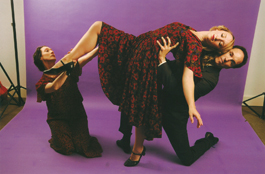home | metro silicon valley index | the arts | stage | review

Photograph by Dave Lepori
Tennessee Waltz: Annette Williams (left), Andrea Moody and Michael Howerton work on 'The Glass Menagerie.'
Dancing on Glass
The Margaret Wingrove Dance Company turns Tennessee Williams' 'Glass Menagerie' into gestures
By Marianne Messina
ACCORDING to choreographer Margaret Wingrove, her latest transformation of literature into dance is "magical, strange and crazy." It will include a cabaret MC (Seth Parker) accoutered as a French mime and a "unicorn that comes to life"—probably not the first things you'd picture in that old Tennessee Williams gloomfest, The Glass Menagerie. Perhaps Wingrove has reclaimed the magic that the tough-minded Williams could reify only as escapism, casting the world of delicate glass figurines as an illusory retreat for the game-legged Laura (danced by Andrea Moody).
While Laura remains at home polishing her glass menagerie, never dating, brother Tommy (Brendan Barthel) is out having normal young-guy experiences. At the urgings of their mother, Amanda (danced by Annette Williams), Tom brings home the equally normal "gentleman caller"—Matt Kovac calls his character "well-intentioned but oblivious." However oblivious, the caller shatters Laura's sheltered glass world when he ignites her passion and then reveals that he is engaged.
"I show you my fiancee," Kovac says, talking while walking through the scene in rehearsal. "And I get very upset," adds Moody, as the two fine-tune this scene. They are working with Wingrove to align the mechanics of romance with the mechanics of balance. A roll of duct tape stands in for a candle; the pair promenade to the empty table where Laura's glass menagerie will be displayed.
Kovac takes Moody's hand and guides her away from the table, again clarifying dramatic points out loud: "How about we sit over here because your animals are weird." They sit and flip through a yearbook dated 1951. "That's actually Margaret's husband," Moody points out. No, the show won't include this illuminating narrative, but the addition of the MC (Parker thinks of his character as "all-knowing") paints a context. When the music begins, and he dons his bowler hat, the laconic Parker shifts from a seemingly flat affect to an expressiveness he describes as "sad and feeling for the characters."
At other times, Wingrove asks that the MC role reflect "plain unadulterated fun. You're flirting with the audience; you're teasing the audience." To the accordion-accompanied voice of Edith Piaf, Parker weaves his way through the Williams characters. "They don't know you're there," Wingrove explains. "They're not connected to you, but you're expressing who they are, so you're connecting to them."
What inspired Wingrove to "try and make something magical" out of this Williams play and, moreover, to add "a little Parisian flavor" to this quintessential American playwright? Wingrove claims that Williams asked for it. She cites an interview in which the playwright called The Glass Menagerie "one of his favorite plays because it's open to interpretation."
The comment inspired her realization that the emotions of The Glass Menagerie "could be so much better represented in body movement." She also felt that "what he's saying is so much more universal"—hence the Piaf. Wingrove connects Amanda's strength to that embodied in Piaf, who, despite her image (her slight build and a last name meaning "sparrow"), toughed her way through a calamitous childhood, the Nazi occupation and a tempestuous love life. As with Amanda, the single-parent theme ran through Piaf's life, which included scratching out a living against a backdrop of cabarets. Amanda's constant reminiscences about her days as Southern belle of the ball often lead to portrayals that make her pitiable, pathologically nostalgic or desperate.
Not so much in Wingrove's dance: "What you see is really how strong she is. She's held everything together. She just doesn't see it herself." Wingrove admits that Williams' ending can often be "dismal," though she promises her ending is anything but. She seems to be going for a certain whimsy: "This is life. It can either go this way or that way, but that's the way life is." As Wingrove says this, referring to her concept of the MC, she shrugs and a sudden mischievous, carnivalesque grin flickers across her face: "Life is a cabaret."
THE MARGARET WINGROVE DANCE COMPANY performs THE GLASS MENAGERIE Thursday–Sunday at 8pm at The Stage, 490 S. First St., San Jose. Tickets are $25–$35. (408.283.7142)
Send a letter to the editor about this story.
|
|
|
|
|
|